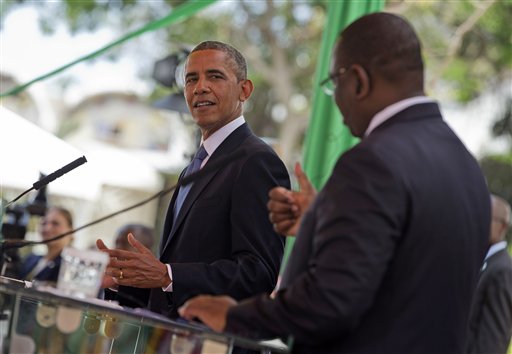President Barack Obama stumbled into controversy on Thursday when he urged African leaders to accept gay marriage and was promptly rebuked by President Macky Sall of Senegal, who said that his country was “not ready to decriminalize homosexuality,” never mind legalizing gay marriage. Senegal is predominantly Muslim.
Macky went further, pointing out that the U.S. is one of the few democratic nations that maintains a death penalty, which Senegal has abolished. Obama himself had been opposed to gay marriage until May 2012.
Gay rights are upheld in very few countries in Africa. One of those is South Africa, where discrimination against gays was outlawed by the country’s new constitution in 1996 but the separate issue of gay marriage was only decided a decade later later by both the Constitutional Court, which recognized same-sex common law partnerships in 2005, and by the legislature, which created civil unions in November 2006. (Polygamy is legal in South Africa under customary or traditional law, and applies to both African and Muslim families.)
Outside of South Africa, which Obama will visit later this week, most African countries–both predominantly Christian and Muslim–reject gay rights. The issue recently caused a schism in the Anglican or Episcopal church, with African bishops breaking with their brethren in the U.K. and the U.S. over gay marriage.
Obama’s precise remarks in the press conference with Sall were as follows, according to the White House:
Now, this topic did not come up in the conversation that I had with President Sall in a bilateral meeting. But let me just make a general statement. The issue of gays and lesbians, and how they’re treated, has come up and has been controversial in many parts of Africa. So I want the African people just to hear what I believe, and that is that every country, every group of people, every religion have different customs, different traditions. And when it comes to people’s personal views and their religious faith, et cetera, I think we have to respect the diversity of views that are there.
But when it comes to how the state treats people, how the law treats people, I believe that everybody has to be treated equally. I don’t believe in discrimination of any sort. That’s my personal view. And I speak as somebody who obviously comes from a country in which there were times when people were not treated equally under the law, and we had to fight long and hard through a civil rights struggle to make sure that happens.
So my basic view is that regardless of race, regardless of religion, regardless of gender, regardless of sexual orientation, when it comes to how the law treats you, how the state treats you — the benefits, the rights and the responsibilities under the law — people should be treated equally. And that’s a principle that I think applies universally, and the good news is it’s an easy principle to remember.
Every world religion has this basic notion that is embodied in the Golden Rule — treat people the way you want to be treated. And I think that applies here as well.
Sall’s response, including his remarks addressing capital punishment, was as follows:
Now, on the issue of homosexuality, Mr. President, you did make a long development on this issue. But you said something very important — general principles which all nations could share, and that is the respect for the human being and non-discrimination. But these issues are all societal issues basically, and we cannot have a standard model which is applicable to all nations, all countries — you said it, we all have different cultures. We have different religions. We have different traditions. And even in countries where this has been decriminalized and homosexual marriage is allowed, people don’t share the same views.
Senegal, as far as it is concerned, is a very tolerant country which does not discriminate in terms of inalienable rights of the human being. We don’t tell anybody that he will not be recruited because he is gay or he will not access a job because his sexual orientation is different. But we are still not ready to decriminalize homosexuality. I’ve already said it in the past, in our Cabinet meeting it is Senegal’s option, at least for the time being, while we have respect for the rights of homosexuals — but for the time being, we are still not ready to change the law.
But of course this does not mean that we are all homophobic. But the society has to absolve these issues. It has to take time to digest them, bringing pressure to bear upon them, on such issues. It is just like the capital punishment. In our country, we have abolished it for many years. In other countries, it is still the order of the day, because the situation in the country requires it. And we do respect the choice of each country. But please be assured that Senegal is a country of freedom and homosexuals are not being prosecuted, persecuted. But we must also show respect for the values and choices of the other Senegalese people.

COMMENTS
Please let us know if you're having issues with commenting.